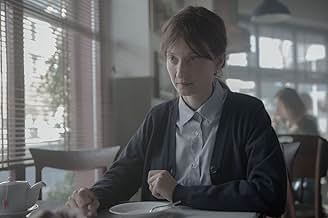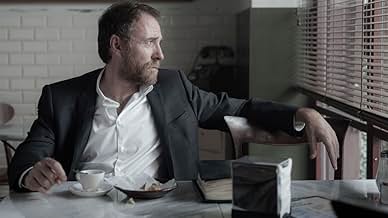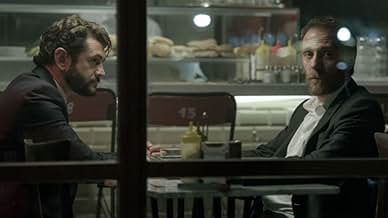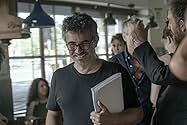NOTE IMDb
7,0/10
13 k
MA NOTE
Le destin d'un groupe apparemment aléatoire d'inconnus qui entrent chacun en contact avec un personnage mystérieux qui, selon eux, possède le pouvoir d'exaucer n'importe quel souhait, en éch... Tout lireLe destin d'un groupe apparemment aléatoire d'inconnus qui entrent chacun en contact avec un personnage mystérieux qui, selon eux, possède le pouvoir d'exaucer n'importe quel souhait, en échange duquel ils doivent accomplir une tâche qu'il leur confie.Le destin d'un groupe apparemment aléatoire d'inconnus qui entrent chacun en contact avec un personnage mystérieux qui, selon eux, possède le pouvoir d'exaucer n'importe quel souhait, en échange duquel ils doivent accomplir une tâche qu'il leur confie.
- Réalisation
- Scénario
- Casting principal
- Récompenses
- 1 victoire et 17 nominations au total
Avis à la une
The Place is a vivid example of why European cinema will always be relevant. A simple tie is maximum, all the actions of the film take place in one place. Ordinary actors (perhaps in Italy they are known, but I only know Marco Giallini). And dialogues. The whole film rests on them. They are as simple as possible - everything is shot in a regular eight. Nice simple chamber story.
Not since My Dinner with Andre can I recall a film set in a single location - now we have this 2017 Italian film The Place, a cafe by that name in which a distinguished-looking fiftyish man holds court at a back table. Supplicants come to him with the problems that most deeply disturb them, and he flips through his thick handwritten notebook to one of the red ribbons - the kind you'd see in a Bible to mark a verse - and tells them what act will bring about what they want.
These acts have nothing to do with their problems - a woman who wants to be prettier is told to steal a very specific amount; a blind man is told that raping a woman will give him sight. But once he pronounces an oracular "deal" he has no alternate solution. They are free not to accept it, or to follow through, but each of them wants their outcome strongly enough to make their pact - at least to begin with.
They stop by to report on their progress, which he records in his notebook. The tasks he assigns often overlap, either by his design or by some hand of providence, and some people get what they ask for, some change their minds and drop the whole thing, and some try to convince him they did as he said - but he tells them they didn't. "How do you know?" A man of few words, he doesn't answer, but we know that they didn't. If they had, something about them would be different.
He is an enigma - we learn the names of some characters, but even in the credits he is Uomo (the Man). He's at The Place when they're setting up in the morning, he's there when the waitress is mopping up at night. As she probes, he admits he doesn't sleep much. We don't see him arrive, we don't see him leave. Sometimes The Place is crowded, other times he's the only customer, and the chairs are upside down on every table except his. Why doesn't he get kicked out? What's his source of funds? He eats and drinks all day, but we never see him pay.
For a man intent on details, he offers few of his own. His supplicants ask him questions, including "Who are you?" which he deflects, returning to why they have come. One character accuses him of being Satan, which he neither confirms nor denies. He displays a lordly indifference to what they think of him - his only concern, once he's assigned their task, is what steps they're taking to complete it.
Is his purpose to awaken conscience, or to demonstrate to people that their desires blot out their morality? Or is he an evil being with the power to grant people's wishes - as long as he gets in trade their compromised integrity? Or is he simply a mirror of a self-absorbed culture in which our happiness is so important we're willing to destroy someone else's to get it?
These acts have nothing to do with their problems - a woman who wants to be prettier is told to steal a very specific amount; a blind man is told that raping a woman will give him sight. But once he pronounces an oracular "deal" he has no alternate solution. They are free not to accept it, or to follow through, but each of them wants their outcome strongly enough to make their pact - at least to begin with.
They stop by to report on their progress, which he records in his notebook. The tasks he assigns often overlap, either by his design or by some hand of providence, and some people get what they ask for, some change their minds and drop the whole thing, and some try to convince him they did as he said - but he tells them they didn't. "How do you know?" A man of few words, he doesn't answer, but we know that they didn't. If they had, something about them would be different.
He is an enigma - we learn the names of some characters, but even in the credits he is Uomo (the Man). He's at The Place when they're setting up in the morning, he's there when the waitress is mopping up at night. As she probes, he admits he doesn't sleep much. We don't see him arrive, we don't see him leave. Sometimes The Place is crowded, other times he's the only customer, and the chairs are upside down on every table except his. Why doesn't he get kicked out? What's his source of funds? He eats and drinks all day, but we never see him pay.
For a man intent on details, he offers few of his own. His supplicants ask him questions, including "Who are you?" which he deflects, returning to why they have come. One character accuses him of being Satan, which he neither confirms nor denies. He displays a lordly indifference to what they think of him - his only concern, once he's assigned their task, is what steps they're taking to complete it.
Is his purpose to awaken conscience, or to demonstrate to people that their desires blot out their morality? Or is he an evil being with the power to grant people's wishes - as long as he gets in trade their compromised integrity? Or is he simply a mirror of a self-absorbed culture in which our happiness is so important we're willing to destroy someone else's to get it?
From a first minute this movie holds all your attention. So unusual plot makes watch until the end no special effects or changing scenery. All actions takes place in cafe, but thanks to characters with their stories you moving to different places as an observer. Many different people come in this cafe for get what you want but in exchange they have to do strange task. Will they be able to make a deal with their principles? We have the opportunity to observe the internal struggle and the consequences of their choice. And the way of their life cross making the plot even more confusing.
A great story, an amazing leading actor.
Do not expect any violence, or action, it is all in the dialogues, plot and acting.
A genre film that can be seen by everybody.
Do not expect any violence, or action, it is all in the dialogues, plot and acting.
A genre film that can be seen by everybody.
The film keeps you engaged from the start, and leaves plenty to think about when it's over. And yet it is neither preachy nor pretentious. It starts off as a film about the things people would be prepared to do in order to achieve their dreams, but it moves on to other themes, such as what you think you need vs. what you really need, being able to live with oneself having achieved something through trickery and evil deeds, or good outcomes eventually arising from people's intentions to actually do bad things. The film does not involve action, it is based around dialogue. But rest assured, it will never bore you, and it will keep introducing twists that will keep you engaged and constantly guessing what will happen next.
Le saviez-vous
- AnecdotesShot in 13 days.
- ConnexionsRemake of The Booth at the End (2011)
Meilleurs choix
Connectez-vous pour évaluer et suivre la liste de favoris afin de recevoir des recommandations personnalisées
- How long is The Place?Alimenté par Alexa
Détails
Box-office
- Montant brut mondial
- 5 784 397 $US
- Durée
- 1h 45min(105 min)
- Couleur
- Rapport de forme
- 2.35 : 1
Contribuer à cette page
Suggérer une modification ou ajouter du contenu manquant

![Regarder Trailer [OV]](https://m.media-amazon.com/images/M/MV5BMGYwOGJlOTUtNjI2Yi00YjE4LTk2MjItMzFiMmIzOGJjMzNjXkEyXkFqcGdeQXRodW1ibmFpbC1pbml0aWFsaXplcg@@._V1_QL75_UX500_CR0)
![Trailer [OV]](https://m.media-amazon.com/images/M/MV5BODk1NGI5OGMtZDQ0My00MjhlLTgxODctZmJlZjVhMWU5YWEyXkEyXkFqcGdeQXRodW1ibmFpbC1pbml0aWFsaXplcg@@._V1_QL75_UX500_CR0)


















